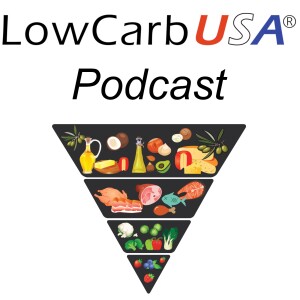
At a time when nearly 90 percent of our human population is metabolically unhealthy, we were extremely interested to meet Jaron Lucas, who has devoted his career to helping dogs regain their health through proper nutrition. Jaron sat down with LowCarbUSA® co-founder Doug Reynolds for an incredibly informative podcast interview.
After personally discovering many of the health benefits after implementing a ketogenic diet for himself, Jaron wondered if he could use what he learned to improve the health of his own dog by changing the formulation of the food he served. “I discovered that the pet food industry is a very large industry with many really terrible products in it, including dry kibble. After doing a good amount of research, I started to believe strongly that we could create something better.”
So he co-founded the Yumwoof Natural Pet Food company along with two others who, like him, had spent years working in the tech industry. The stated mission of their company is to increase the health span of dogs through the creation of healthy food for dogs. “We went back, and we looked at NIH studies that have been done over the last 10 to 15 years,” said Jaron, “and we looked at the AAFCO (Association of American Feed Control Officials) dog food nutrient profiles with the goal of creating an industry-leading low carb dog food.”
He discovered that many of the most popular brands of dog food are loaded with nearly 50% carbohydrates, a fact that does not align well with the primarily meat-based diet that dogs historically consumed. “One of my biggest pet peeves in the pet food industry is the marketing lie that rice and potatoes are good for your dog,” said Jaron. “There no scientific evidence to show that dogs were digging potatoes out of the ground and eating them. They're just chains of simple sugar molecules that raise blood insulin levels, and cause the same kind of damage in dogs as they do in humans.”
He talked with Doug about the surging rates of obesity in dogs, which he says is caused by diets containing too many carbohydrates and the feedings which, in many cases, are too frequent. “We’re seeing a 60% obesity rate in dogs,” he said. “When dogs eat too much (carbs), they can't store it anymore in their fat cells. Diabetes rates have almost doubled over the last 20 years in dogs.”
According to an article Jaron recently wrote, “...canine diabetes is up 79% since 2006, 56% of dogs are now classified as obese, and almost half of dogs over the age of 10 will develop cancer.” He explained how he and his partners have created a recipe that includes important vitamins and minerals dogs need, as well as other ingredients such as antioxidants and MCT oils. “Might that help them live longer?” The answer is yes,” said Jaron. “There have been many studies done to show that dogs with more antioxidants in their diet benefit.”
Discussing a study that compared dogs that ate a processed diet, (dry kibble) to dogs that ate a natural diet of whole foods, he says, “Unsurprisingly, the group of dogs who were eating whole foods had doubled the microbiome diversity than the other dogs, which is associated with greater longevity,” said Jaron. ”We are trying to apply this latest nutrition evidence to fulfill our company mission of extending the lifespan of all dogs.”
He went on to explain how popular dog food companies exploit the current labeling requirements, specifically the fact that carbohydrates do not need to be listed per FDA and AAFCO requirements. The reason, according to Jaron, is motivated by profit. Carbohydrates in the form of rice and potatoes are cheap, and their use leads to larger margins. he also explained how many brands use ingredients like beef meal, chicken meal, fish meal, and other byproducts to make their products more profitable. “Not a lot of people know this, but beef meal is where they just take the beef bones and put them through a highly processed manufacturing process to extract all the protein that's left. There’s a lot of ultra processing going on in the creation of most dry kibble.”
“This is a topic that's really important to me,” said Jaron. “The largest pet food companies who manufacture dry kibble are also effectively in control of the regulating body in pet food. I think that a grassroot action is really the only way that we can achieve change.” He has launched a petition aimed at getting United States lawmakers to add carbohydrate nutritional information to pet food labels. “This is really a passion project for me,” he said, “I think we need to work to bring a greater level of honesty to the pet food industry, for the benefit of consumers and their dogs.
More Episodes
Create your
podcast in
minutes
- Full-featured podcast site
- Unlimited storage and bandwidth
- Comprehensive podcast stats
- Distribute to Apple Podcasts, Spotify, and more
- Make money with your podcast
It is Free
- Privacy Policy
- Cookie Policy
- Terms of Use
- Consent Preferences
- Copyright © 2015-2024 Podbean.com







